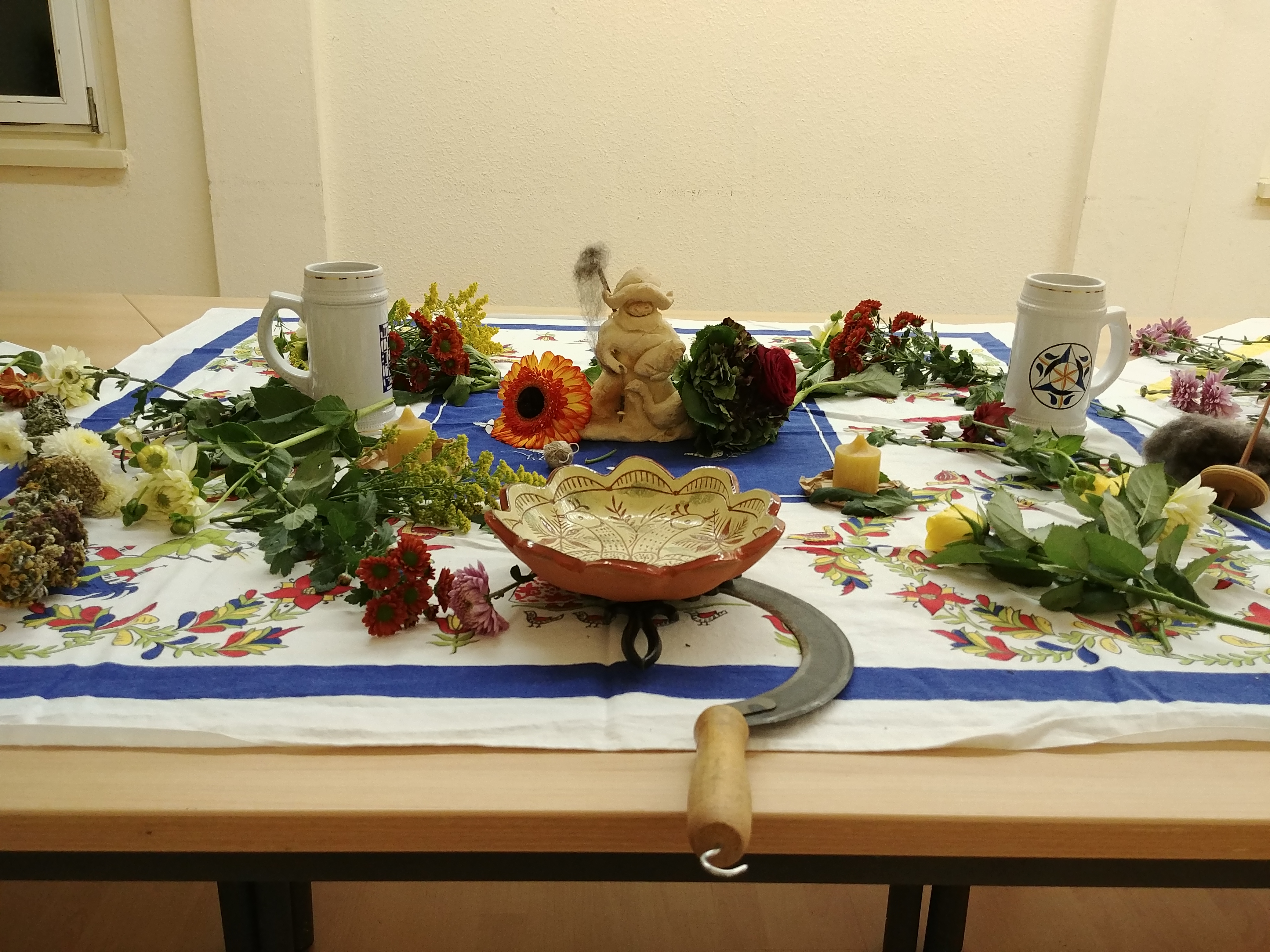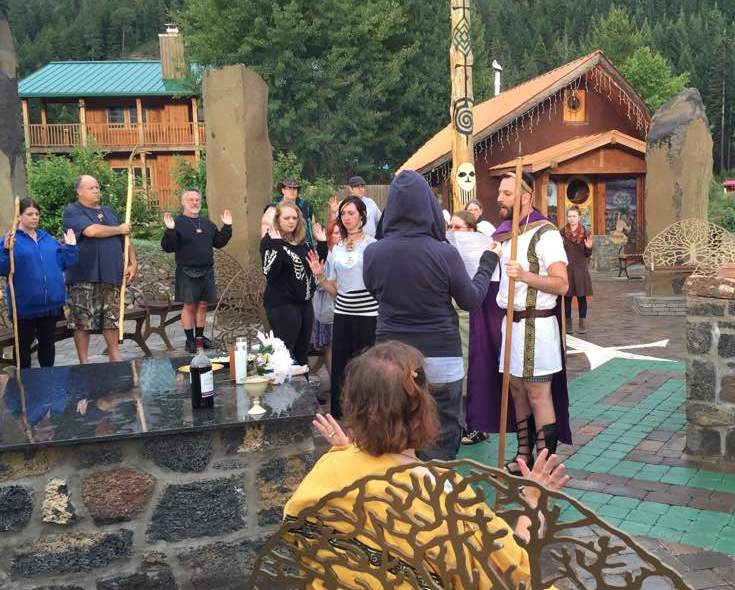
TWH – Anxiety is the body’s natural emotional response to stress. But it can also become debilitating when worry and fear never subside. Recent psychological research now suggests that rituals can offer relief.
Almost a century ago, social theorist and anthropologist, Bronislaw Malinowski suggested that rituals are inherently associated with anxiety-inducing events and situations. Malinowski hypothesized that “magico-religious rituals” emerged as emotional responses to achieve a desired goal that ultimately alleviates anxiety, particularly when groups or individuals were confronting uncontrollable events.
An example of Malinowski’s premise would be that a ritual behavior emerges because of fears from a storm – an event that cannot be controlled. But the individual or group can construct a ritual that imagines the storm’s passing. Regardless of the magickal properties of such a ritual, the perception that action can bring an uncontrollable event under control, can reduce anxiety about the event.
Previous research on rituals has looked at their effectiveness on ritual being able to help individuals take control of events.
In 2010, research by Damisch, Stoberock, and Mussweiler reported results on a set of fascinating experiments where participants attempted 10 golf putts from a one meter distance. Some participants, those in the “primed” group, the group exposed to the suggestion, were told, ‘‘Here is the ball. So far it has turned out to be a lucky ball.’’ A control group was told ‘‘This is the ball everyone has used so far.’’

Obviously, the participants were blind to the differences between the two groups and were not told the objective of the experiment.
Participants in the control group made 48% of the putts. But, participants in the primed group made 65% of the putts, a result that is statistically significant. Both groups being equal, the only difference that could account for advantaged putting was the priming statement of a lucky ball.
Their original experiment has been difficult to replicate, raising questions about the findings and certainly that more work needs to be done. But the initial results hint that belief matters a great deal in ritual. in this case, belief that that ball was somehow associated with improved performance.
A few years ago, in 2013, Norton & Gino reported the results of a series of experiments to examine how rituals can help regain feelings of control during periods of loss. They conducted some lab experiments to examine how ritual might affect the experience of loss.
In one experiment, participants were asked about either a relationship ending or a death. They were then asked “Please describe this event in detail. What was it like to be in this situation? What thoughts and feelings did you experience?”
Participants in the ritual condition were then further asked “please describe a RITUAL you engaged in after you experienced the loss (e.g., you stopped going to a place that was meaningful for your relationship with this person for a while, you stopped wearing clothes he/she liked for a while). Please provide a detailed description.”
All participants completed a measure of perceived control and grief. The participants who reported a ritual action also reported reduced grief and less lack of control.
In another experiment, individuals received $15 for participating in an experiment that involved the possible winning of an additional $200. Participants thought that the experiment was about a lottery, but it was actually about how rituals help mitigate feelings of defeat and grief.
Before beginning the lottery experiment, participants were asked about their belief in rituals and then asked to participate in one involving using some words, salt and paper to limit feelings of loss. As expected, the participants who partook in rituals, reported feeling less grief regardless of whether they believed in the ritual.
With these as examples, research points to the acts of (a) referring to a set of actions as ritual and (b) that executing them as such are critical elements to produce beneficial psychological effects. That is, rituals reduce negative emotions.
Previous research had also found that rituals help with negative emotions and worry. Sosis & Handwerker in 2007 had reported that Israeli women who recited psalms during threats of missile attacks experienced less anxiety than Israeli women who did not engage in any similar practice.
But anxiety and ritual had not been studied in the lab to explore Malinowski’s hypothesis.
Lang, Krátký, and Xygalatas reported last week in Philosophical Transactions of the Royal Society B. the results of a controlled experiment looking specifically at the benefits of ritual on anxiety control.

Fortuna Ritual 2016 [Courtesy]
The experiment involved asking participants in Mauritius, all Hindus, to prepare a plan for a natural disaster, like a cyclone or flood. They would then present the plan in a speech to experts who would evaluate them. This is referred to as an anxiogenic or anxiety-provoking task. The participants also wore technology to measure physiological indicators of stress and anxiety, like heart rate, which affirmed an increase in anxiety markers.
But then the group was randomly assigned to two conditions: a ritual group and a control group. The ritual group was invited to visit a room where they had materials available to them materials for ritual and offerings (incense, fruit, etc). The control group was invited to sit quietly for 11 minutes.
The results suggested that the participants in the control group were more relaxed at baseline. But by the end of the task, the group that performed the ritual fared better on all their indicators of physiological and psychological stress.
The team of researchers suggests that ritual reduces anxiety by offering the brain a sense of predictability through structured behavior and a sense of control.
The benefits of ritual are well-known to Pagan practitioners. As Rev. Selena Fox wrote, “Through rituals, Pagans deepen their relationship with the Divine in one or more sacred forms. Through rituals, Pagan culture flourishes and evolves.”
Like prayer, rituals serve as a source of reflection. They help us better understand the present moment and our place in the web of relationships around us. They also help us understand the actions we must take to develop ourselves personally and spiritually.
While more research is certainly needed, psychology may now be affirming some of those benefits as a means to manage anxiety.
The Wild Hunt is not responsible for links to external content.
To join a conversation on this post:
Visit our The Wild Hunt subreddit! Point your favorite browser to https://www.reddit.com/r/The_Wild_Hunt_News/, then click “JOIN”. Make sure to click the bell, too, to be notified of new articles posted to our subreddit.